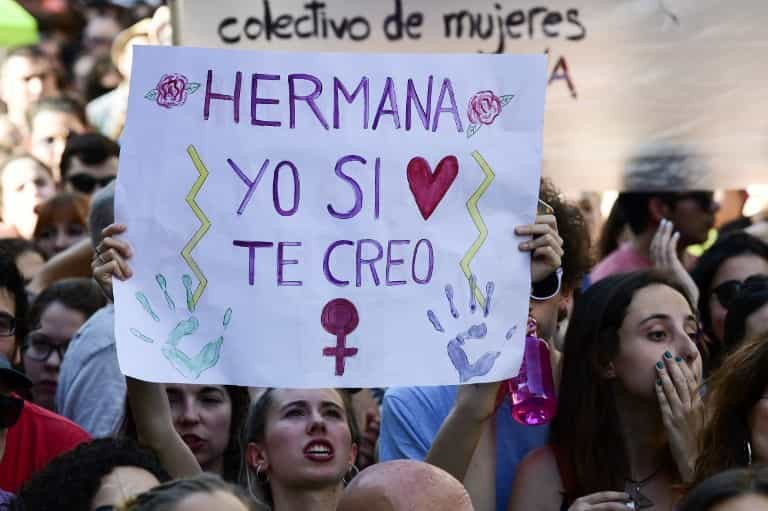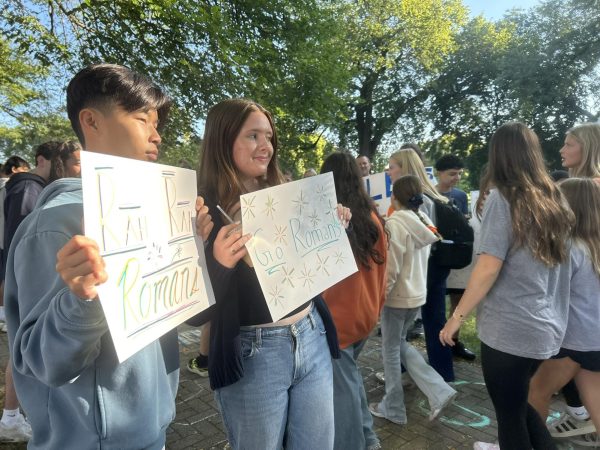What News Has Been Overshadowed by COVID-19?
AFP
A woman holds a placard reading “Sister, I believe you”, during a demonstration in Madrid on June 22, 2018, a day after a court ordered the release on bail of five men sentenced to nine years in prison for sexually abusing a young woman at Pamplona’s bull-running festival. The men, who called themselves “the pack” in a WhatsApp messaging group, had been accused of raping a woman, then 18, at the entrance to an apartment building in Pamplona on July 7, 2016, at the start of the week-long San Fermin festival, which draws tens of thousands of visitors. / AFP PHOTO / JAVIER SORIANO
April 25, 2020
Amidst the uncertainty felt across the world due to the COVID-19 pandemic, news outlets have been focused on making sure the world knows the latest virus-related updates. However, while every reporter and news station covers the coronavirus, who is reporting other world news?
In Mexico, a nationwide movement similar to the #MeToo movement in the United States sparked as tens of thousands of women demanded government action to prevent the killing of ten women a day, on average, due to their gender. Femicides, the killing of women and girls solely based on their gender, have gone unnoticed in the Mexican government as President Andrés Obrador claimed they were a result of “past neoliberal policies” at the hands of his political opponents, reports New York Times journalist Paulina Villegas. While women gained some of their rights in America from the Women’s Suffrage Movement (ending in 1920), Mexican women are still oppressed under the Mexican culture rooted in machismo and gender-based violence. To protest this, tens of thousands of women left their jobs on Monday, March 9th in a strike to demonstrate how the disappearances of ten women a day should be felt in offices, restaurants, schools, government buildings, etc. With this protest, thousands of women were out of the workforce for the entire day, forcing dozens of schools, offices, and stores to shut down.
Maya Passman, a senior co-head of Latin’s Alliance for Women, says, “Marches have this amazing ability to make you feel so powerful and heard. I think they really empower a lot of people to find their voice for social justice.” Making a statement in response, President Obrador claimed he recognizes this as an important cause and would continue to work towards women’s safety throughout the remainder of his presidency.
Additionally, despite the massive decreases in pollution fumes throughout the globe, the Great Barrier Reef underwent a third mass bleaching in under five years at the hands of global warming. A stretch of 1,500 miles (2,300 km) has been severely bleached with an estimated half of the coral dead as ocean temperatures continue to rise. An event such as this was not anticipated to occur until at least the middle of the century in 2050 says Terry Hughes, director of Coral Reef Studies at James Cook University. For the first time, the bleaching has spread to all three parts of the Great Barrier Reef, reaching the northern, central, and southern portions of the reef as the most widespread bleaching event in history. The 2020 bleaching event is not only the largest event on record but the second most damaging with impacts likely to be irreparable (CNN, Helen Regan). The Great Barrier Reef is home to not only thousands of species of marine life but contributes more than $5.6 billion to Australia’s economy and creates tens of thousands of jobs, all of which will be lost along with the reef. As Covid-19 lingers, pollution rates and the vibration of the Earth have lessened, but this is only short-term. As society begins to re-open and human activity increases, there is a likelihood these rates may even escalate further than before as people are more eager to travel and work. This is why it is more important than ever to stress the urgency of political action to decrease the likelihood that pollution rates and global warming will continue to intensify.
Tim Cronister, an avid environmentalist and Director of Student Life at Latin, says he knows, “If I can inspire a few more to consider ways to protect our planet, I’ve done my job.”
The coverage of COVID-19 is of great importance, however, given the continuance of pre-pandemic suffering worldwide, differing world events are of equal significance. The women’s movement in Mexico marked a tremendous landmark in Mexican history as did the beginning of the Women’s Suffrage Movement in America and deserves equal recognition as it would at any other time. Global warming has been a worldwide topic of concern for years and in order to further the global movement towards a better climate, it is crucial that this revolution is not forgotten for its impact is still felt by millions.





















































